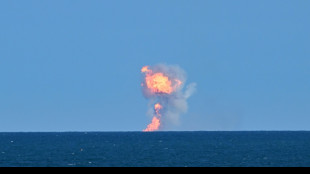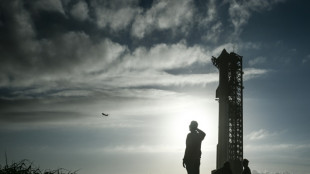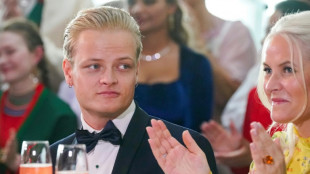
-
 Japanese, Koreans bottom of global love life survey
Japanese, Koreans bottom of global love life survey
-
Japan ramps up tech ambitions with $65 bn for AI, chips

-
 Taliban govt clearing 'un-Islamic' books from Afghanistan shelves
Taliban govt clearing 'un-Islamic' books from Afghanistan shelves
-
Asian markets struggle as traders weigh geopolitical tensions

-
 Iraq holds its first census in nearly 40 years
Iraq holds its first census in nearly 40 years
-
SpaceX fails to repeat Starship booster catch, as Trump watches on

-
 European powers, US seek to censure Iran at UN nuclear watchdog board
European powers, US seek to censure Iran at UN nuclear watchdog board
-
SpaceX fails to repeat Starship booster catch, as Trump looks on

-
 European stocks fall on Ukraine-Russia fears, US focused on earnings
European stocks fall on Ukraine-Russia fears, US focused on earnings
-
Trump names China hawk Howard Lutnick commerce secretary

-
 SpaceX set for Starship's next flight -- with Trump watching
SpaceX set for Starship's next flight -- with Trump watching
-
Top-selling daily French daily Ouest-France stops posting on X

-
 Russian invasion toll on environment $71 billion, Ukraine says
Russian invasion toll on environment $71 billion, Ukraine says
-
New Botswana leader eyes cannabis, sunshine to lift economy

-
 China's Xi urges 'strategic' ties in talks with Germany's Scholz
China's Xi urges 'strategic' ties in talks with Germany's Scholz
-
COP29 negotiators strive for deal after G20 'marching orders'

-
 Walmart lifts full-year forecast after strong Q3
Walmart lifts full-year forecast after strong Q3
-
Son of Norwegian princess arrested on suspicion of rape

-
 US lawmaker accuses Azerbaijan in near 'assault' at COP29
US lawmaker accuses Azerbaijan in near 'assault' at COP29
-
Spain royals to visit flood epicentre after chaotic trip: media

-
 French farmers step up protests against EU-Mercosur deal
French farmers step up protests against EU-Mercosur deal
-
Burst dike leaves Filipino farmers under water

-
 Markets rally after US bounce as Nvidia comes into focus
Markets rally after US bounce as Nvidia comes into focus
-
Crisis-hit Thyssenkrupp books another hefty annual loss

-
 Farmers descend on London to overturn inheritance tax change
Farmers descend on London to overturn inheritance tax change
-
Floods strike thousands of houses in northern Philippines

-
 SpaceX set for Starship's next flight, Trump expected to attend
SpaceX set for Starship's next flight, Trump expected to attend
-
Several children injured in car crash at central China school

-
 Urban mosquito sparks malaria surge in East Africa
Urban mosquito sparks malaria surge in East Africa
-
Many children injured after car crashes at central China school: state media

-
 Asian markets rally after US bounce as Nvidia comes into focus
Asian markets rally after US bounce as Nvidia comes into focus
-
Tens of thousands march in New Zealand Maori rights protest

-
 Five takeaways from the G20 summit in Rio
Five takeaways from the G20 summit in Rio
-
Parts of Great Barrier Reef suffer highest coral mortality on record

-
 Defiant Lebanese harvest olives in the shadow of war
Defiant Lebanese harvest olives in the shadow of war
-
Divided G20 fails to agree on climate, Ukraine

-
 Can the Trump-Musk 'bromance' last?
Can the Trump-Musk 'bromance' last?
-
US to call for Google to sell Chrome browser: report

-
 Trump expected to attend next Starship rocket launch: reports
Trump expected to attend next Starship rocket launch: reports
-
Stocks, dollar hesitant as traders brace for Nvidia earnings

-
 Biden in 'historic' pledge for poor nations ahead of Trump return
Biden in 'historic' pledge for poor nations ahead of Trump return
-
Tropical storm Sara kills four in Honduras and Nicaragua

-
 Spanish resort to ban new holiday flats in 43 neighbourhoods
Spanish resort to ban new holiday flats in 43 neighbourhoods
-
Phone documentary details Afghan women's struggle under Taliban govt

-
 G20 wrestles with wars, 'turbulence' in run-up to Trump
G20 wrestles with wars, 'turbulence' in run-up to Trump
-
Stocks, dollar hesitant as traders eye US rate outlook, Nvidia

-
 G20 wrestles with wars, climate in run-up to Trump
G20 wrestles with wars, climate in run-up to Trump
-
G20 host Brazil launches alliance to end 'scourge' of hunger

-
 Stocks, dollar hesitant as traders scale back US rate cut bets
Stocks, dollar hesitant as traders scale back US rate cut bets
-
Trump confirms plan to use military for mass deportation


Sweden seeks to be winemaking's next frontier
Far north of iconic wine regions like Bordeaux and Tuscany, Sweden is seeing a burgeoning industry of vineyards and a first generation of winemakers trying to carve out a niche.
"There are millions of techniques, and I don't have a grandfather or grandmother to ask. So we need to figure it out ourselves," Lena Magnergard, 64, told AFP as she walked through the short rows of grapevines at the Selaon vineyard an hour west of Stockholm.
The former communications professional started the vineyard, the most northern Swedish site to have produced its own wine according to Magnergard, together with her farmer husband Erik Bjorkman in 2019 on the family farm.
They produced their first wine in 2021 but Magnegard, a trained sommelier, is quick to admit that as keepers of some 1,000 vines they are still learning.
"Of course you can read up in books, but that is nothing like generational knowledge," she said, adding that they mostly look to France and its centuries of winemaking tradition as the gold standard.
According to Magnergard, the emergence of wineries this far north is largely thanks to the development of new breeds of grapes in the 1960s and 70s, such as Solaris -- which was developed to be resistant to disease and is the main grape grown at Selaon.
- Resistance to cold -
"What they then discovered about these grapes, by pure chance, was two things -- they need less time between blooming and harvesting and they can handle cold very well," Magnergard said.
That combination was perfect for the Nordic region, where summers are both shorter and colder.
In the south of Sweden, on the Bjare peninsula, Solaris also dominates the 11-hectare Thora Vineyard -- started in 2015 by a Swedish-American couple.
But it also features more well-known grapes such as Pinot noir -- which is less expected so far north due to it requiring more heat.
For French-born winemaker Romain Chichery, who started working on the vineyard together with colleague Emma Berto three years ago, Sweden is "a new playground".
The 27-year-old wine specialist admitted to AFP that they "didn't expect so many varieties to take.
"Once we had analysed the climatic data, we realised that there was potential for many varieties and not just hybrid varieties, which are interesting but not the only solution" for Swedish soils, he added.
As a warmer climate is disrupting harvests in traditional wine-growing areas, professional wine growers have begun to look further north.
However, the Scandinavian country is not exempt from the variations of the climate.
"We have extremes, just like everywhere else in Europe," Chichery noted.
At the same time, exploring a new frontier of wine also frees winemakers from old established rules.
"We're free to do what we want. If I want to make a red with a little residual sugar, so a slightly sweet red, I can do that," he said.
In Sweden, the industry has picked up speed in recent years and the country is now home to some 50 commercial vineyards of varying sizes.
According to industry group Svenskt Vin, 200 hectares are now being cultivated, which while twice as many as five years ago is little compared to the 800,000 hectares devoted to viticulture in France.
For Murat "Murre" Sofrakis, the figure is still unimpressive, and the 56-year-old foresees much greater things in the future.
Sofrakis runs a small vineyard in the far south of Sweden but is a champion of Swedish winemaking.
- Equal terms -
"There are two kinds of people. One is the entrepreneur that sees opportunity here... and for the other people, it's like a lifestyle," he told AFP.
For him, the aim is to invigorate the industry, and he believes a recent liberalisation of the Swedish strict alcohol monopoly should help.
In June, Sweden's government announced it wanted to allow breweries, distilleries and winemakers to sell alcoholic beverages directly to customers visiting their operations.
Apart from bars and restaurants, Swedes can only buy beverages with an alcohol content above 3.5 percent at state-run outlets called Systembolaget, and some authorised retailers in rural areas.
The proposal to allow winemakers to sell three litres of wine to visitors is currently being reviewed but the government said it hopes to see it implemented in the first half of 2025.
"It's the first time we've been able to compete on equal terms with the rest of the wine world, and that's very important," Sofrakis said.
He started in 2001, just two years after the European Union gave permission for vines to be grown commercially in Sweden.
"If we'd had this 20 years ago, Swedish winegrowing would be much bigger," he said.
H.Müller--CPN
